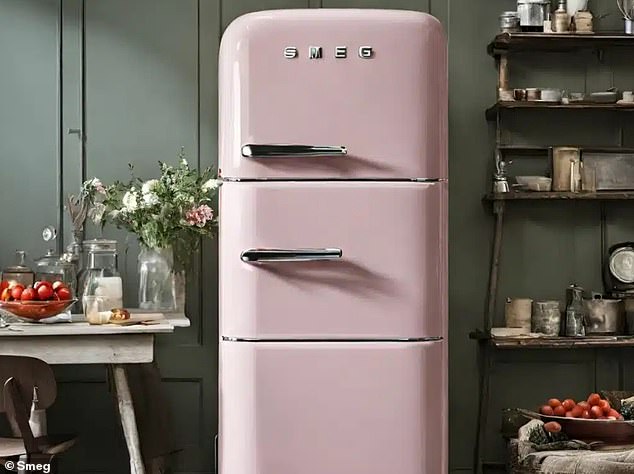The kitchen has long been the focal point of the middle class family home, a communal area where guests are invited to admire wine coolers, perch on marble island bar stools and coo over sleek appliances.
However, as Britain’s straitened times continue, with inflation predicted to rise to 3.5% this year and interest rates still high, it seems the demand for certain upmarket kitchen brands have slumped.
Smeg, best know for its range of pastel coloured retro-style fridges which were huge in the 90s, has reported a dip in demand for its once fashionable appliances, which can cost up to around £4,000 for a top-of-the-range model.
Other brands beloved of the middle and upper classes, including Aga’s cast-iron cookers and French cookware brand Le Creuset, have also struggled with falling sales in recent years, as cheaper lookalike alternatives have flooded the market.
While homeowners are still investing in high quality appliances, attention has turned away from statement fridges and towards state-of-the-art hobs.
The Aga has long been a status symbol for the middle and upper classes, particularly in rural homes.
However, this summer, the British-born brand, now owned byIllinois-based Middleby, reported a painful drop in sales, saying it had been ‘negatively impacted’ by inflation.
While discerning home cooks still seemingly want tradition, their heads have been turned by improved technology – with induction hobs and air fryers now the focus of consumers’ attention.

Has ‘Stagflation’ hit the kitchen? Smeg, most famous for its retro style fridges, says it has seen a slump in demand, with Managing DirectorDaniel Hadley blaming ‘challenging’ marketing conditions
La Cornue, a French heritage brand now also owned by Middleby, has successfully bridged the gap between tradition and tech.
Currently selling at John Lewis is a La Cornue 110cm electric range cooker that comes with five induction hobs – in contrast to the Aga’s radiant heat method of cooking.Its price tag? A cool£9,039. A 90cm version comes in at£8,240.
Speaking to The Telegraph, Smeg’s Managing Director, Daniel Hadley, said economic conditions were making marketing conditions ‘challenging’ and affecting sales, but said people still aspired to high quality goods in their kitchens.
He said: ‘With the increasing cost of living, people are often spending more time in the home, cooking and entertaining.
‘Rather than ‘trading down’, we see that customers push themselves to buy the best product they can afford.’
The brand has branched out from its retro designs and concentrated on upscaling other kitchen essentials including kettles to‘elevate tea and coffee routines’.
While Le Creuset’s stoneware andenameled cast iron pots and saucepans are still lusted after – with a lively resale market on sites such as ebay and Vinted, buying them brand new can quickly see a few items rack up to the thousands, with its iconic oval casserole dish alone costing up to £599.
Since 2020, the brand, founded in 1925, has seen pre-tax profits drop by nearly 80 per cent.
Yesterday, it was revealed Britons are facing the highest inflation in the G7 region as the country reels from the impact of Labour’s tax raid on employers..

The hob has become the statement piece in the kitchen – but only if it embraces state-of-the-art cookery tech. Pictured: French heritage brand La Cornue, which is faithful to range cooking but comes with an induction hob

Stoneware brand Le Creuset is still thriving on re-sale sites such as Vinted and eBay but has also been affected by the economy, with pre-tax profits dropping by nearly 80 per cent since 2020
The OECD, Organisation for Economic Co-operation and Development, has given a stark warning about the backdrop for Rachel Reeves as she prepares for a crucial Budget.
The international body said price pressures would be worse in Britain this year than any other major economy – and only behind the US next year.
Growth has been pencilled in marginally higher this year at 1.4 per cent. But it is then seen as dropping to 1 per cent in 2026 as higher tax and spending cuts squash activity, adding to a hit from US President Donald Trump’s tariff hikes.
The report emerged as separate PMI figures suggested growth in the private sector has slowed to its weakest level since May – with higher business costs meaning ‘subdued’ demand and further job cuts.
The bleak figures suggest the UK is at risk of another bout of ‘Stagflation’, where prices surge but the economy stalls.








